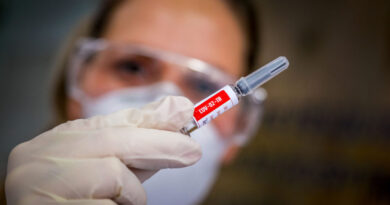Are the Unvaxxed Deadly Drivers?
[embedded content]
Story at-a-glance
- A Canadian study concluded that people who are not vaccinated have a relative risk of more car accidents. According to the design and data, you don’t even have to be in the car to be a greater risk
- The researchers concluded that doctors should counsel patients to be better drivers and insurance companies should raise rates of the unvaccinated. Dr. Vinay Prasad calls the study misguided, profoundly unethical and deeply disrespectful
- Prasad also notes the researchers did not account for at least two important confounding factors and made a “flippant recommendation” to raise insurance rates without evidence to back it up
- While the published conclusions could not be made on the data, the study did inadvertently create a falsification test, demonstrating that observational studies published since the vaccine was released have a fatal flaw
In this 12-minute video, oncologist, author and speaker Dr. Vinay Prasad identifies several flaws in the design and conclusions of a December 2022 research study. Researchers from Sunnybrook Research Institute1 in Canada published the study in the American Journal of Medicine,2 concluding that people who are not vaccinated get into more car accidents than those who choose to take the experimental genetic jab.
There were many problems with the study, which Prasad believes is nothing more than clickbait for the mainstream media as the headlines from Yahoo! News,3 Fortune,4 and the Times of India5 have demonstrated.
The results of this study add to the poor “science” that mainstream media and some public health experts are using to stigmatize and dehumanize those who have chosen to protect their health without taking the jab. This is even more irrational as you consider the shot does not prevent infection and does not prevent the spread of the virus.
People who have received one, two, three or more doses are still getting infected, and at ever-increasing rates. They are spreading the infection to those who are vaxxed and unvaxxed and, based on data collected by the FDA and CDC,6 the jab may be just as dangerous and likely to kill as the virus. More than 80 studies7 have shown that natural immunity to SARS-CoV-2 is equal or superior to the immunity you get from the jab.
Whatever protection may be ascribed to the jab, studies have also shown that the effectiveness rapidly wanes.
One Swedish 2022 study,8 found the Pfizer jab declined from 92% effectiveness at Day 15 through Day 30; to 47% effectiveness by Day 121 through 180; and 23% by Day 211 and onward. The effectiveness of the AstraZeneca shot was not detectable from Day 121 onward.
Yet, for the first time in modern medical history, people with natural immunity are labeled as dangerous, and are shunned and even fired from their jobs for refusing to take the shot.9
High Accident Risk for the Unjabbed — Even Out of the Car
With the accident study, researchers made a considerable leap in their theory that vaccine hesitancy could contribute to traffic safety.10 To test their suspicion, they evaluated a cohort of 11,270,763 Canadians, 16% of whom were unvaccinated and 84% of whom had received a vaccine.
They counted 6,682 traffic crashes in Ontario11 during the study period, including pedestrians, which meant that if you were not in a car and not vaccinated in this study, you were more likely to be involved in a car accident. They found those who were unvaccinated accounted for 1,682 crashes or 25% of the accidents, which they adjusted to a 72% increase in relative risk as compared to those who were vaccinated.
Conversely, 75% of the accidents occurred in vaccinated individuals. The researchers used the relative risk score to draw their conclusions. They also adjusted for some confounding factors such as age, socioeconomic status, medical diagnosis, sex and home location.
The researchers concluded that “These data suggest that COVID vaccine hesitancy is associated with significant increased risks of a traffic crash. An awareness of these risks might help to encourage more COVID vaccination.”12
In a press release, the principal investigator and senior scientist acknowledged the study did not show causality, but “Instead, it suggests that adults who do not follow public health advice may also neglect the rules of the road.”13 In other words, the researchers used relative risk to create an association between the jab and car accidents, even if you aren’t in a car.
Multiple Issues With the Design, Results and Recommendations
In the video above, Prasad describes14 design flaws which significantly taint any recommendations that could be made from the data. He acknowledges that the researchers adjusted for many confounding factors, but then points out that they did not adjust for two factors that may have significantly impacted the data.
The first is the number of miles driven, since many believe the risk of an accident is proportional to the number of miles you routinely drive. This is a commonly held belief that doesn’t account for the type of driving — city or highway — and the age of the driver.15 However, the researchers should have factored in the type of driving or number of miles driven before concluding that people who are not vaccinated are just “reckless drivers.”
Secondly, the researchers should have entertained the possibility that the car being driven had an impact on the risk of a car accident. Prasad admits that 20 years ago this may not have been a salient factor, but today’s vehicles are equipped with computer and safety systems that can stop the car automatically when it detects an obstacle rapidly approaching from the front and can keep the car in the lane. Prasad said:16
“Researchers should at least adjust for the type of car. These researchers, of course, they don’t discuss it, as if they’re not aware, and they don’t do it. And that’s another failure of their analysis.”
Based on the data, the researchers also recommended that people who are unvaccinated should be counseled by their physicians to drive carefully. “This is a pretty stupid thing to say because they have no data to support that claim,” Prasad said.
He notes that to support the recommendation of counseling the unvaccinated to drive more carefully, the researchers need to prove that counseling unvaccinated people lowers the risk of a car accident. Then, to further prove causality, scientists must demonstrate that counseling vaccinated people does not lower their risk of a car accident. This would identify that the group who benefits from counseling are the unvaccinated.17
“They’ve done none of that. They haven’t even tried to do that. They’re just talking. They’re just saying things you could do that sound bioplausible. They’re just making things up. It’s rather disgraceful as a researcher to say things without having any basis for those claims. This is an extremely problematic recommendation; level of evidence — garbage.”
Recommendation May Lead to Rising Insurance Rates
The researchers also included the recommendation of raising insurance premiums for people who do not take the shot. This is yet another way of stigmatizing and punishing individuals with the intent of pushing an agenda by attacking people’s pocketbooks. Prasad notes that actuarial rates and insurance premiums are not always based on causal factors. However, using a vaccine as a factor would have spillover effects and is a “dangerous business.”
He called this a “flippant recommendation” that was made without the appropriate studies to understand unanticipated consequences. Such a recommendation should not have been published until they had the evidence to back it up. Prasad questions whether this is arguably a discriminatory action if it’s found that people who are not vaccinated are more likely to be part of a specific racial group or socioeconomic status.
In other words, raising insurance rates because you aren’t vaccinated becomes a code word for racial and socioeconomic disparities, which allows companies the ability to discriminate using a proxy. In a real-life example, in August 2021,18 Delta Airlines announced that any unvaccinated employees would incur a $200 monthly surcharge on their health insurance.
This is one coercive method used to drive people to take the genetic jab. For Delta Airlines, 20% more employees took the injection, raising the injection rate from 74% to 78% of the company. Yet, if reducing health care costs for the company were the real goal, Delta would offer access to inexpensive, early prevention and treatment to ensure lower costs.
On the surface, this was an illegal move since the Patient Protection and Affordable Care Act (ACA)19 and Health Insurance Portability and Accountability Act of 1996 (HIPAA)20 prohibit group health plans and insurers from discriminating against individuals based on health factors.
But, by making the injections a requirement of the wellness program, Delta was “rewarding” members who participated by letting them avoid the premium surcharge they saddled on the unvaccinated. The featured study may generate further industry interest to raise rates and therefore pad their financial bottom line.
With the accident study, it isn’t health insurance, but car insurance that would come under scrutiny, which leads to wonder how much longer it will be before the insurance industry finds a reason to charge you more for life insurance or homeowners’ insurance because you have not accepted an experimental shot?
The Study Is an Inadvertent Falsification Test
While Prasad notes that the writers could not make these conclusions based on the data, the study did inadvertently show that observational studies published since the vaccine was released, which compared children or young adults who were vaccinated to those who were unvaccinated, have a fatal flaw.21
The result of the featured study shows that the people in past observational studies are likely not from the same groups. In other words, the reasons people choose to be vaccinated or unvaccinated may have more to do with the case rate or death rate than the shot.
“They are basically running what we in medicine call a falsification test, an endpoint that you don’t think is causally linked to the vaccines to prove that the two cohorts are actually dissimilar. That’s what they’re running and they’ve inadvertently done this, which undermines the entire genre of observational data that supports vaccination.”
He went on to say that the irony of the paper is that they also inadvertently created a falsification test that shows observational data for COVID-19 vaccines are likely unreliable. However, they misinterpreted the results:22
“… as an impetus to provide specific driving counseling to unvaccinated people, a recommendation they’ve pulled directly from their ass because they have no data for that.
And, a request to raise insurance premiums, a recommendation they’ve also pulled from their ass with unintended spillover effects on society, and on anger, and on how the public acts reacts to public health in the future that they’ve not considered in any way shape or form.”
Results Reveal a Deeply Intolerant Medical Profession
Prasad begins his analysis of the study saying, “Let’s get to the bottom of this claim. I find it deeply problematic on both face value and what it reveals about us as an intolerant profession.”23 He continues that, in the broader culture of medicine, “this paper is loathsome, it’s despicable.”
The concern is that the study promotes the idea of stigmatizing people based on their decisions, whereas progressive medical thinking is founded on the idea that patients are treated no matter their situation. He notes that doctors must treat patients equally — those who have done the worst things imaginable and those who have done some of the best things imaginable.
His point is that physicians should not discriminate based on decisions their patients have made. But this study shows that science has now identified a group of individuals that society has given carte blanche to stigmatize. Prasad questions whether that is a realistic assessment of the situation since decisions are a product of an individual’s socioeconomic, racial and cultural factors.
Instead, the paper feeds a narrative that it’s OK to stigmatize a group of individuals, and Prasad notes that whether or not an individual or large groups of individuals are vaccinated or unvaccinated, “it won’t affect the spread of the virus across society: It’s like spitting in the ocean:”
“Their research is misguided, it is profoundly unethical, it’s deeply disrespectful of causality and disrespectful … to make medicine and medical research be used as a force of good rather than a force for clickbait headlines. I think they’ve confused the two.
On my Substack I wrote a paper and said using the same methods you could probably show that unvaccinated people are more likely to lose fingers. Why? Because maybe they work more in factories, and they have more finger accidents and so therefore we should counsel them to keep their fingers attached.”



